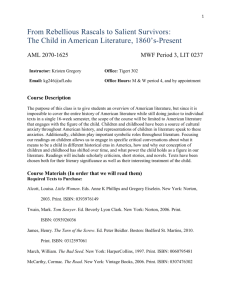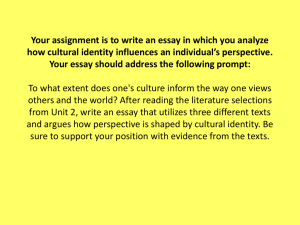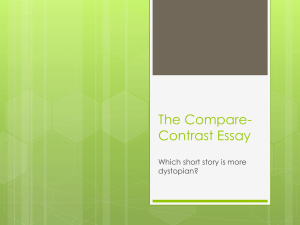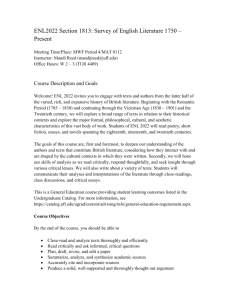AML 2410, Section 1615, Greogry
advertisement
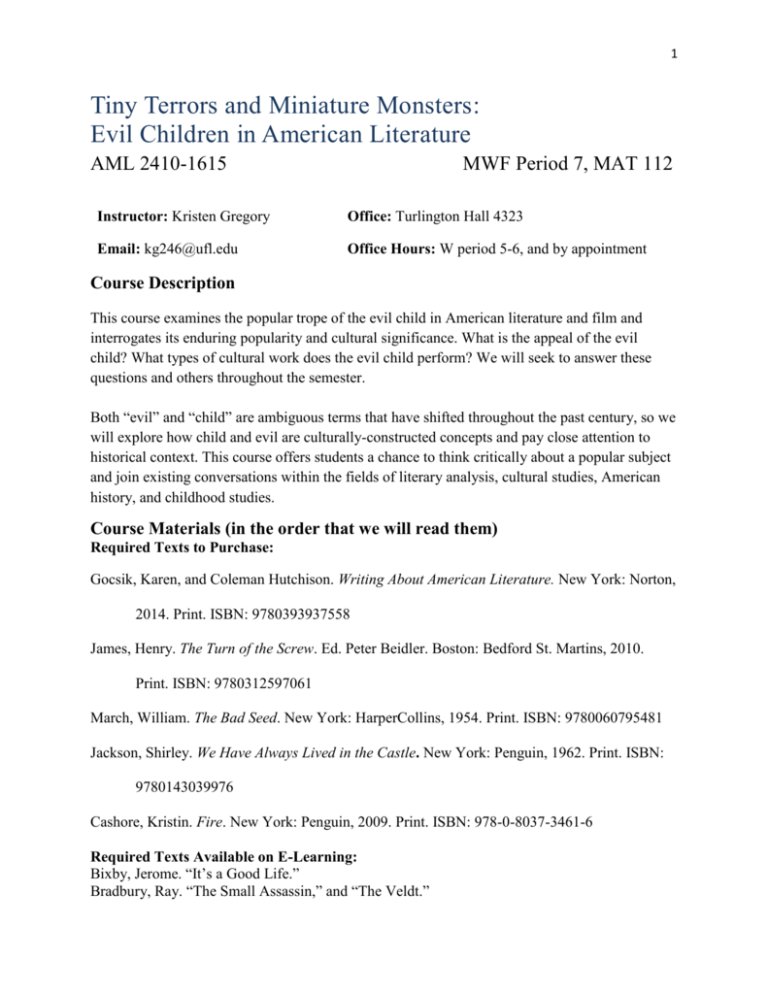
1 Tiny Terrors and Miniature Monsters: Evil Children in American Literature AML 2410-1615 MWF Period 7, MAT 112 Instructor: Kristen Gregory Office: Turlington Hall 4323 Email: kg246@ufl.edu Office Hours: W period 5-6, and by appointment Course Description This course examines the popular trope of the evil child in American literature and film and interrogates its enduring popularity and cultural significance. What is the appeal of the evil child? What types of cultural work does the evil child perform? We will seek to answer these questions and others throughout the semester. Both “evil” and “child” are ambiguous terms that have shifted throughout the past century, so we will explore how child and evil are culturally-constructed concepts and pay close attention to historical context. This course offers students a chance to think critically about a popular subject and join existing conversations within the fields of literary analysis, cultural studies, American history, and childhood studies. Course Materials (in the order that we will read them) Required Texts to Purchase: Gocsik, Karen, and Coleman Hutchison. Writing About American Literature. New York: Norton, 2014. Print. ISBN: 9780393937558 James, Henry. The Turn of the Screw. Ed. Peter Beidler. Boston: Bedford St. Martins, 2010. Print. ISBN: 9780312597061 March, William. The Bad Seed. New York: HarperCollins, 1954. Print. ISBN: 9780060795481 Jackson, Shirley. We Have Always Lived in the Castle. New York: Penguin, 1962. Print. ISBN: 9780143039976 Cashore, Kristin. Fire. New York: Penguin, 2009. Print. ISBN: 978-0-8037-3461-6 Required Texts Available on E-Learning: Bixby, Jerome. “It’s a Good Life.” Bradbury, Ray. “The Small Assassin,” and “The Veldt.” 2 Matheson, Richard. “Born of Man and Woman.” Munro, Alice. “Child’s Play.” Oates, Joyce Carol. “The Accursed Inhabitants of the House of Bly.” O’Connor, Flannery. “The Lame Shall Enter First.” We will read supplementary scholarly criticism to be determined by the instructor *Many of the assigned viewings are available on Netflix. Course Outcomes: By the end of the semester, students should be able to engage in scholarly conversations about American literature, American culture, and childhood studies. Students should be able to make historical, literary, critical or theoretical statements about the texts we’ve read and should be able to support those statements. Students should be able to think critically about literature, synthesize literature with relevant scholarship, and construct cohesive, convincing arguments about literature. Additionally, students should have refined their basic writing skills, including MLA documentation style, drafting, proofreading, editing, and composing a polished final product. Assignments and Participation: Adaptation Analysis (1000 words) 15% This essay asks students to consider the implications of adaptation. How does a film version of one of our primary texts choose to tell the story? What changes are made from the original text, and what is the significance of these changes? How does the adaptation allow for a different interpretation of the story, and why does this matter? Literary Analysis (1000 words) 15% This essay asks students to consider the significance of textual elements and literary devices to one of our primary texts as a whole. How does the author use symbolism to draw attention to an important theme? What does the setting contribute to the text? What motifs are repeated and what do they suggest about the whole text? How does one individual character fit into and contribute to the entire scheme of things? Contextual Analysis (1000 words) 15% This essay asks students to consider the social, cultural, and political contexts in which one of our primary texts was/is produced and consumed. How is the text a product of its cultural context? How does the text reflect certain concerns from its historical period? How might the text influence its surroundings? To what extent does the text comment on cultural, political, or social issues? Proposal and Annotated Bibliography (1000 words) 10% Students will choose one of their three essays to revise and expand upon for their final paper. The final paper will need to include five secondary scholarly sources, so students will turn in proposals and annotated bibliographies to explain how they intend to continue with one of their essays and summarize the relevant scholarship they plan to incorporate into the final version. Final Argumentative Essay (2000 words) 25% For this final assignment, students should revise and expand upon one of their earlier essays. The final version should incorporate five scholarly sources and contain a clear, well-supported argument. Participation 20% 3 This class depends on lively and informed class discussions, which means that students are expected to come to class having read the texts and prepared to contribute talking points or raise questions in the discussion. If I ever notice a lull in class participation that suggests students are not prepared to discuss the readings, then I will begin assigning pop quizzes over the reading. Grades: Grading Scale A 93-100% B 83-86.9% C 73-76.9% D 63-66.9% A- 90-92.9% B- 80-82.9% C- 70-72.9% D- 60-62.9% B+ 87-89.9% C+ 77-79.9% D+ 67-69.9% E 0-59.9% General Assessment Rubric A Insightful: You did what the assignment asked for at a high quality level, with care and precision, and your work shows originality and creativity. Work in this range shows all the qualities listed below for a “B,” but it also demonstrates that you took extra steps to be original or creative in developing content and style. Work in the “A” range is not only convincing and intriguing, but also illuminating. Since careful editing and proofreading are essential in writing, papers in the A range must be free of typos and grammatical or mechanical errors. B Proficient: You did what the assignment asked of you at a high quality level. Work in this range is competent, thoughtful, and considered, but it needs revision. To be in the “B” range, an essay must be complete in content, be well organized, and show special attention to style. C Satisfactory: You did what the assignment asked of you and demonstrated that you have a generalized comprehension of the ideas/films/essays you’re working with. Work in this range needs significant revision, but it is complete in content and the organization is logical. Diction may be imprecise or unclear. The style is straightforward but unremarkable. D Poor: You did what the assignment asked of you at a poor quality level. Work in this range needs significant revision. The content is often incomplete and/or the organization is hard to discern. Support is irrelevant, overgeneralized, lacks validity, and/or is absent. Ideas/texts are oversimplified. Work in this range may have no thesis statement, or may stray significantly from the thesis throughout the essay. Attention to style is often nonexistent or uneven. E An E is usually reserved for people who don't do the work, or don't come to class, or those who have plagiarized. However, if your work shows little understanding of the needs of the assignment or demonstrates that you put little effort in completing it, you will receive a failing grade. 4 *You must pass this course with a “C” or better to satisfy the CLAS requirement for Composition (C) and to receive the 6,000-word University Writing Requirement credit (E6). You must turn in all papers totaling 6,000 words to receive credit for writing 6,000 words. NOTE ALSO: a grade of “C-” will not confer credit for the University Writing Requirement or the CLAS Composition (C) requirement. Course Policies Participation and Attendance Regular attendance and active participation are crucial. Class participation includes contributing to class discussions; coming to class on time, prepared with books and homework; preparing for in-class activities; providing adequate drafts for group work; collaborating and participating in group activities; and overall working and paying close attention to the lectures and activities of the classroom. In general, students are expected to contribute constructively to each class session. Because this class depends on student-led discussion, you must bring the texts to each class and be prepared with notes and questions to contribute to the class. In this course we will follow a strict attendance policy that is consistent with UF’s policies on excused and unexcused absences. If you miss more than three periods during the term, you will receive a 3% deduction from your final grade for each absence after the third. If you miss more than 6 classes, you will fail the entire course. The university exempts from this policy only those absences involving university-sponsored events, such as athletics and band, and religious holidays. Absences related to university-sponsored events must be discussed with me prior to the date that will be missed. Please Note: If you are absent, it is your responsibility to make yourself aware of all due dates. If absent due to a scheduled event, you are still responsible for turning assignments in on time. Tardiness: Tardiness creates a problem for the entire class since it can disrupt work in progress. Tardiness will be reflected in lost points. Classroom Conduct Please treat your classmates and myself with respect. Keep in mind that students come from diverse cultural, economic, and ethnic backgrounds. Some of the texts we will discuss and write about engage controversial topics and opinions. Diversified student backgrounds combined with provocative texts require that you demonstrate respect for ideas that may differ from your own. Disrespectful behavior will result in dismissal, and accordingly absence, from the class. Any use of electronic devices not related to classroom learning: phones, personal data assistants, iPods, etc. are disruptive and will not be tolerated. Please turn them on silent and keep them out of sight. Assignment Maintenance Responsibilities You are responsible for maintaining copies of all work submitted in this course and retaining all returned, marked work until the semester is over. Should the need arise for a resubmission of papers or a review of marked papers, it is your responsibility to have and to make available this material. Late Work Policy and Mode of Submission 5 I do not accept late work. All papers will be submitted as MS Word (.doc) or Rich Text Format (.rtf) documents to E-learning. I may consider extenuating circumstances, but you must contact me at least twenty-four hours before the assignment is due. All drafts should be polished and presented in a professional manner. All papers must be in 12-point Times New Roman font, single-spaced with 1-inch margins and numbered pages. Final Grade Appeals Students may appeal a final grade by filling out a form available from Carla Blount, Program Assistant in Department of English. Grade appeals may result in a higher, unchanged, or lower final grade. University Policies General Education This is a General Education course providing student learning outcomes listed in the Undergraduate Catalog. For more information, see https://catalog.ufl.edu/ugrad/current/advising/info/general-education-requirement.aspx Statement of Composition (C) Credit This course can satisfy the UF General Education requirement for Composition. For more information, see: https://catalog.ufl.edu/ugrad/current/advising/info/general-educationrequirement.aspx Statement of Writing Requirement This course can provide 6000 words toward fulfillment of the UF requirement for writing. For more information, see: https://catalog.ufl.edu/ugrad/current/advising/info/writing-and-mathrequirement.aspx Students with Disabilities The University of Florida complies with the Americans with Disabilities Act. The Disability Resource Center in the Dean of Students Office provides information and support regarding accommodations for students with disabilities. For more information, see: http://www.dso.ufl.edu/drc/. The office will provide documentation to the student who must then provide this documentation to the instructor when requesting accommodation. Statement of Harassment UF provides an educational and working environment that is free from sex discrimination and sexual harassment for its students, staff, and faculty. For more about UF policies regarding harassment, see: http://www.dso.ufl.edu/sccr/sexual/ Statement on Academic Honesty All students must abide by the Student Honor Code. For more information about academic honesty, including definitions of plagiarism and unauthorized collaboration, see: http://www.dso.ufl.edu/sccr/honorcodes/honorcode.php 6 Reading Schedule Monday Wednesday No Class Course Intro Week One (1/5) Unit One: Possessed or Debased?: The Fear of Corrupted Children Unit Intro Turn of the Screw Week Two (1/12) No Class Turn of the Screw Week Three (1/19) Oates, “Accursed Writing Lesson Week Four (1/26) Friday Evil Children Lecture Turn of the Screw The Innocents (1961) Essay 1 Due Inhabitants” Unit Two: Natural or Created?: The Mystery of Murderous Children Unit Intro The Bad Seed Week Five (2/2) The Bad Seed Dexter Week Six (2/9) “The Lame Shall Enter Writing Lesson Week Seven (2/16) The Bad Seed Dexter Essay 2 Due First” Unit Three: Childish or Cruel?: The Danger of Infantile Minds Unit Intro “Child’s Play” and “Born Week Eight (2/23) Week Nine (3/2) Week Ten (3/9) Week Eleven (3/16) No Class We Have Always Lived in the Castle We Have Always Lived in the Castle of Man and Woman” No Class We Have Always Lived in the Castle Writing Lesson Unit Four: Gifted or Monstrous?: The Threat of Exceptional Children Unit Intro “It’s a Good Life” Week Twelve (3/23) Fire Fire Week Thirteen (3/30) Week Fourteen (4/6) Week Fifteen (4/13) Fire Fire Fire Carrie Week Sixteen (4/20) Peer Review Course Conclusion “The Veldt” and “The Small Assassin” No Class We Have Always Lived in the Castle Essay 3 Due Research Lesson Proposal/Annotated Bibliography Due Fire Buffy the Vampire Slayer No Class-Final Essay Due

